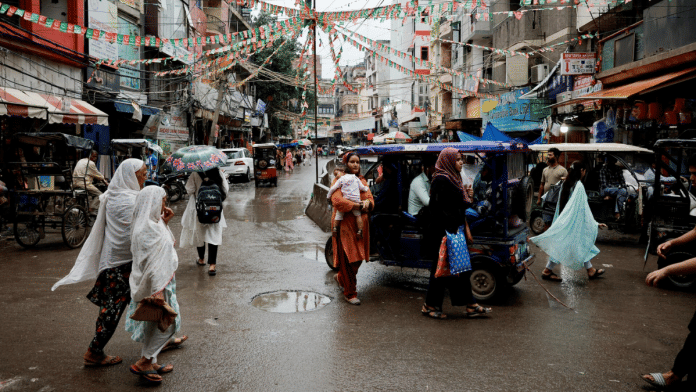Thank you dear subscribers, we are overwhelmed with your response.
Your Turn is a unique section from ThePrint featuring points of view from its subscribers. If you are a subscriber, have a point of view, please send it to us. If not, do subscribe here: https://theprint.in/subscribe/
The Prophet Muhammad (SWT) had once warned: “What I fear most for my people is misleading leaders” (Musnad Ahmad). He foresaw a time when those who claimed to guard the faith would, in fact, distort it for power, politics, and patriarchy. Today Indian Muslims find themselves under such stranglehold of conservative clerics. These ulemas and Maulanas preach submission, silence women, and exploit religion for political influence rather than as a path to God. Across sects, there are custodians of faith preaching half-baked, patriarchal, and bigoted sermons especially targeting women, even issuing paid fatwas intended to malign the Indian Muslim community. While the Quran honors men and women as each other’s protectors (9:71), conservative ulemas have twisted Sharia to confine women, denying them education, inheritance, leadership, and freedom. As Zakia Soman, co-founder of the Bharatiya Muslim Mahila Andolan (BMMA), puts it: “The self-appointed custodians of Islam are doing the greatest disservice to Islam and Muslims, women especially.”
This clerical dominance did not emerge overnight. The tragedy of Partition led to great social, political, and economic brain drain from the Indian Muslim community. This left the majority of Indian Muslims battered, disoriented, economically fragile, and without strong, educated leadership. In this vacuum, conservative ulemas cleverly stepped in as brokers between political elites and a fearful community. After the religious divide inspired Partition, it was the ulemas who pledged their loyalty to the new secular Indian state and to its constitution, thereby impressing the new political elite and getting close to leaders from all political spectrums.
The mechanisms behind their influence differ by region. In Uttar Pradesh and Bihar, madrasas became default educators for poor Muslims. In Hyderabad, elites fostered ritualistic conservatism, leaving the masses impoverished. Kerala absorbed hardline Salafi influences alongwith prosperity from Gulf remittances. Across India, West Asian petrodollars legitimized puritanical ideologies, at odds with India’s pluralistic Islamic traditions. More recently, similar trends emerged in West Bengal, where new ulemas promote bigoted values and conservative dress codes for women, often with political backing. Poverty, literacy gaps, and ghettoization compounded this, allowing ulemas disproportionate power to entrench backwardness under claims of divine sanction.
At the heart of this clerical pretension sits the All India Muslim Personal Law Board (AIMPLB): an NGO of self-elected ulemas with no statutory authority, Quranic legitimacy, or democratic mandate. Still, it claims to be guardian of Muslim personal law, often obstructing reforms such as triple talaq abolition, resisting women’s rights, and parroting imported dogma. In reality, it is more a political bargaining tool than a religious authority, a self-appointed oligarchy rarely reflecting the true diversity of India’s Muslims.
Despite this dominance, many have championed progressive causes. In the 1960s, Hamid Dalwai founded the Muslim Satyashodhak Mandal to fight for women’s rights, secular education, and end triple talaq, but met vilification from clerics and apathy from political parties. Decades later, Zakia Soman and BMMA led successful legal battles, including against triple talaq and for women’s access to the Haji Ali Dargah. In 2018, Jamida Beevi in Kerala led a mixed-gender Friday prayer, shattering ritual authority’s male monopoly despite swift backlash. Voices like Tufail Ahmad continue to press for secular education and systemic reform, arguing Muslims cannot modernize while under ulema control and medieval mindsets.
Tragically, the failures of reform stem from a toxic triangle of politics, media, and clerical opportunism, compounded by rising anti-Muslim sentiment nationwide. When the Supreme Court struck down instant triple talaq in 2017 and Parliament outlawed it, this potential milestone for Muslim women became political fodder. The ruling party claimed sole credit, branding itself reformist, while clerics convinced parts of the Opposition it was an assault on minority rights. Media coverage framed the issue as Hindu nationalists versus Muslim clerics, erasing the impact of grassroots Muslim women. Thus, every reform is painted as state interference, the government claims benevolence, and real reformers are erased.
Yet cracks are appearing in the conservative wall. Economic liberalization, migration, and internet access are opening new worlds for young Muslims. Women’s literacy, though still around 70% compared to the national 82%, is rising, and unprecedented numbers of Muslim women are attending university. While workforce participation remains low, progress is visible.
And with education comes skepticism. The recent West Bengal Urdu Academy’s withdrawal of an invitation to poet Javed Akhtar after clerical objection was widely mocked by educated Muslims, signalling that ulema control is waning.
The greatest enemy of Indian Muslims is not external. Unless we the Indian Muslims claim our own leadership, conservative mullahs will continue selling the community’s future for personal gain. Embracing Islam’s progressive traditions, strengthening reformist movements, and democratizing religious leadership is imperative.
Liberation will come only by rejecting false authority and seeking a future grounded in justice, knowledge, and equality. Choice is clear, either we remain chained by false leaders or reclaim the Quran’s message of justice and equality. The future will belong to those who choose courage over submission and knowledge over ignorance.
These pieces are being published as they have been received – they have not been edited/fact-checked by ThePrint.


